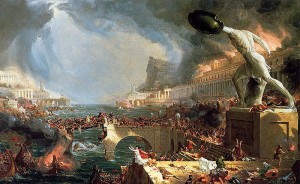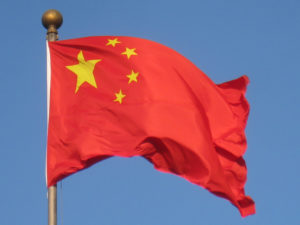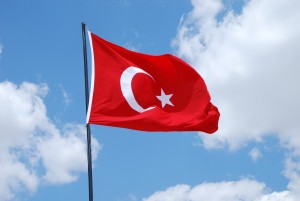
The Course of Empire by Thomas Cole
Saudi Arabia, Egypt, United Arab Emirates, and Bahrain recently cut off diplomatic relations with Qatar and launched an embargo, stating that they wanted the media outlet Al Jazeera shut down, and support for the Muslim Brotherhood ended.
Or, more colloquially, and good for a belly laugh, for these entities to “stop supporting terrorists,” which coming from any of those countries–and especially Saudi Arabia–is so flamingly hypocritical it puts the sun in shadow.
Oh my God.
Unfortunately for Saudi Arabia and its allies, Qatar has yet to give in, and it has been backed up by Turkey (who sent troops), and Iran (who is sending food).
Then we have the war against Yemen. Saudi Arabia invaded Yemen, with a huge coalition, and US support, and, well, what have they accomplished? I suspect the main accomplishment will be crippling Yemen’s next generation by starving them when they were young.
And, some time back, Saudi Arabia decided to lower oil prices to push out Western producers and…Oh, look! Oil prices are too low to support Saudi Arabia.
The joke in Saudi Arabia, I understand is, “My grandfather rode a camel, I drive a car, my grandson will ride a camel.”
Saudi Arabia is doomed. The current king is an incompetent, thrashing around trying to solve problems and making them worse. He, as with his forbears, sees foes everywhere; unlike his predecessors, he isn’t willing to simply sit and let sores fester. He wants to do something about them, and so far, what he’s done has made them worse.
This is fairly standard: All dynasties go bad eventually because the kings-to-be grow up in wealth and power and think their privilege is the natural state of things. They believe they are brilliant and deserve it all, when it was handed them on a platter. Perhaps they are good at palace intrigue and think that extends beyond the palace.
It doesn’t.
But this is worse than that; Saudi Arabia is just an undeveloped country sitting on oil. It’s that simple. Their particular ideology did not allow them to control their population, and the source of their power, oil, was always going to be replaced as the world’s most important energy source at some point. That “some point” is now close.
Electric cars are coming. It is that simple. And when they do, oil will never recover.
As with all such windfalls, the only correct way to deal with resource windfalls is to siphon them off from the regular economy and develop the new economy. That is almost never done, and the story is always the same. Sometimes it takes decades, sometimes centuries, but the resource is always either replaced or depleted and the country or area, never having developed an actual economy, goes into terminal decline.
I live near one such place: the Canadian Maritime provinces. Once, this was the main supplier of ships’ masts in the British Empire. As the entire empire ran on sailing ships, this made it important. When steam took over, there were no ship masts left, and the Maritimes have never recovered.
Alberta, Canada’s oil patch, will likely experience the same story, with the added problem of having destroyed much of its soil, so that it cannot even go back to its full, agricultural roots.
Saudi Arabia is DONE. Like other rich and powerful countries, and Saudi Arabia has been a great power (though not a super power), its death throes will be terrible. Yemen is collateral damage; part of the early collapse. Likewise, Qatar. From the long point of view, this all just has to play out; for those on the ground, it will be ugly.
There are good Saudis, even as there are good Americans, and they have my sympathy, but I have little hope to offer them. Saudi Arabia is a classic example of over-development, on top of resource sickness: The land cannot support the population, and relatively soon, in historical terms, it will not be able to afford the necessary imports.
Civil war and implosion, famine and catastrophe are all next to certain. If you live in Saudi, it is probably time to get out. What is to come is unlikely to be avoided; it would take vast amounts of luck. Luck Saudi Arabia, in making so many enemies, has made unlikely to occur.
And a lot of people, close or far from Saudi, will suffer as it destructs.
The results of the work I do, like this article, are free, but food isn’t, so if you value my work, please DONATE or SUBSCRIBE.

 Recently, the Chinese Communist Party proposed removing the normal ten year limit on how long someone can stay President.
Recently, the Chinese Communist Party proposed removing the normal ten year limit on how long someone can stay President. 
 Erdogan was gleeful during the coup, and
Erdogan was gleeful during the coup, and